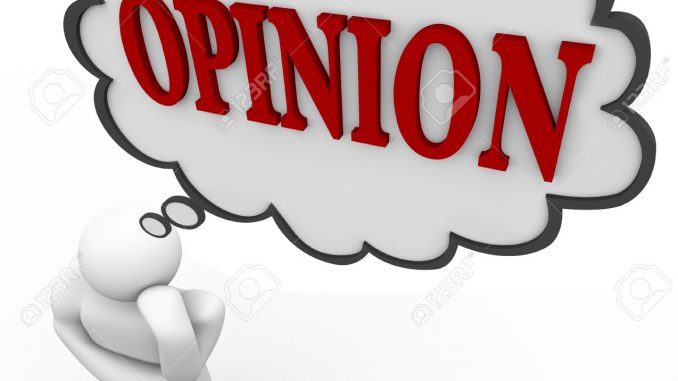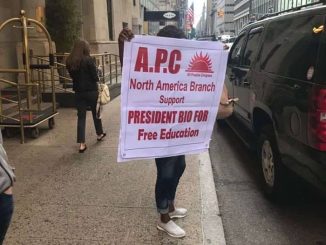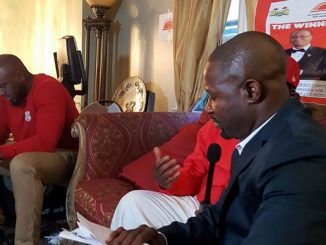
By Karamoh Kabba
More than a year after the 2018 general elections in Sierra Leone, the actual voting process ended with the presidential election runoff in April, but a vicious electoral process lingers on, further stressing and expanding the southeast/northwest divide beyond political lineage into a deep seated tribal cleavage.
Predominantly, unlike the major and most populous Temne tribe in the north, the Mende tribe in the southeast has more or less engulfed all the smaller and less populous tribes in its midst save for the people of Kono District which swings as a result.
Kono District and Western Area, both known swing political districts, have however tilted more towards the APC in elections for the most part of the nation’s political history.
Unlike the APC, the SLPP government’s penchant for tribalism has limited its ability in providing the needed political leadership to manage the existing sharp political divide which is now degenerating into tribal divide under president Julius Maada Bio in the body politic of country.
And indeed, some political pundits and social commentators have it that this once manageable political divide, now compounded by tribalism, is a replay of 1964 under prime minister Sir Albert Margai of the SLPP party. Others, especially some CSO operatives, are fervently positioning that it’s a replay of 2007-2018 political predisposition under former president Dr. Ernest Bai Koroma.
But when none of the two major political parties, the All Peoples Congress (APC) and the Sierra Leone People’s Party (SLPP) could achieve the Constitutional requirement of 55% threshold to win the presidency, the National Election Commission (NEC) balanced the votes between the APC and the SLPP as if it were a loaf of bread.
The above is completely different from the natural voting pattern and outcome that’s often the effect of the great political divide and the voting habit of the swing political districts in the past.
Indeed, the international community, international and local elections observers have recently frowned at and questioned the conduct of NEC in conducting bye elections thereafter when they weighed in with cautionary statements.
Notably, the National Grand Coalition (NGC) and the APC parties accused NEC of outright roguery in a re-run council seat bye election in Tonko Limba. Despite that great reprimand by international and moral guarantors, NEC was again accused by the C4C party of its failed attempt to repeat the Tonko Limba distasteful experience in the council seat bye election in Kono District.
The above misgivings by NEC are further strengthening the APC’s resolve in contesting the outcome of the re-run presidential election in Court. The impossibility of losing the presidency upon winning majority of the Local Council (LG) and 68 parliamentary seats as against 49 seats won by the SLPP in the same elections process has been cited. This is backed by evidence of voting and elections misconducts the Party authorities tendered before the justice system.
The SLPP on the other hand has refused to accept that the APC won the majority seats in Parliament but instead of using the Court, the police, acting under ‘orders from above’ beat up and bundled all 68 APC MPs out of the Well of Parliament before using a lopsided Parliament to elect the Speaker of the House.
Meanwhile, the judiciary, again, acting under the notorious ‘orders from above’ refused to list the APC’s petition case against president Julius Maada Bio, petitions of 32 Parliamentary seats and a host of other cases the Party filed with the Supreme Court for constitutional interpretation are all unattended.
It’s against the foregoing backdrop that two High Court judges ruled against 10 APC MPs in petition cases of allegations ranging from election violence, elections malpractice to pre-election constitutional violation against admonitions of the parties by international and moral guarantors that the elections were all certified by local and international elections observers to be free and fair and that all parties should deal with their elections losses and gains.
The disturbing trend though is the observable growing disenchantment in the political dispensation here amongst opposition politicians being exacerbated by the SLPP government’s old aged paternalistic and obsolete fusing of all three organs of government in one place under the Executive at State House and using financial inducement to silence the media and civil society operatives to have a grip on power and carry on with unchecked and unabated abuse of power and human rights.
Be that as it may, the international community and local moral guarantors have recognised an existence of heightened political tensions which did not exist in the country since the short-lived overthrow of president Ahmad Tejan Kabbah in 1997.
Amidst an array of acts of constitutional abuses, human rights abuses, tribal based mass sacking of tenured workers, police brutality against ordinary citizens and opposition leaders, members and supporters, president Maada Bio has repudiated expert position that there’s existence of heightened political tension in the country when he stated that “those who believe that there’s political tension in Sierra Leone are doing so in the figment of their imagination”, a position many attentive political observers consider to be obdurate and disingenuous.
To defuse the identifiable heightened political tension despite the president’s insistence that there’s none, many people believe that the unending and vicious elections circle must come to an end; that the National Election Commission (NEC) must conclude the electoral process by publishing the results of the presidential election and must challenge the two High Court judges whose rulings are in blatant violation of the Constitution and the electoral laws of Sierra Leone in the Appeals Court because the Commission was a defendant in the cases and that, above all, the government must reverse the outcomes of all unconstitutional processes



